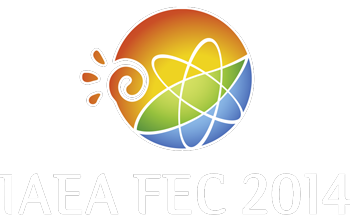Speaker
Dr
Wilfred Anthony Cooper
(Ecole Polytechnique Federale de Lausanne (EPFL), Association Euratom-Suisse, Centre de Recherches en Physique des Plasmas (CRPP))
Description
A MagnetoHydroDynamic (MHD) equilibrium model to treat plasma rotation approximately in three-dimensional (3D) tokamak geometry with nested flux surfaces is explored. For this purpose, we assume in 3D that the velocity is purely toroidal in (R,phi,Z) cylindrical coordinates. Furthermore, we impose that the toroidal angular rotation frequency is constant on each flux surface. Isothermal conditions are invoked so the temperature is also constant on a flux surface. The MHD force balance relation contains an extra term absent in the axisymmetric limit that causes problems to obtain a closed analytic formulation. However, experimental observations provide us with a guide to progress further. Specifically, the measurements on MAST with Long-Lived Modes (LLM) indicate that the toroidal rotation becomes rigid in the core of the plasma where the 3D deformation is large, but sheared flow survives in the outer region which essentially retains axisymmetric properties. Under these conditions, the term in question vanishes. Then, the rigourous energy functional that describes MHD toroidal flow in the axiymmetric limit becomes applicable in this case. The 3D VMEC equilibrium solver has been adapted to numerically investigate the approximate toroidal rotation model we have derived. We concentrate our applications on the simulation of MAST LLMs. We have successfully computed bifurcated solutions of the MHD equilibrium state with a helical core deformation in the presence of toroidal flow with an angular rotation frequence that is flat in the core (nearly rigid) and sheared at the edge. The centrifugal force has the effect of diminishing the helical distortion of the pressure compared with that of the magnetic geometry. The magnitude of the deformation is most sensitive to details of the safety factor q-profile, mainly the proximity of q_(min) to unity and the radial location of q_(min) in the simulations with weak reversed magnetic shear that we have performed. Fast particle confinement is investigated with the guiding centre orbit code VENUS. In the presence of toroidal flow, the drift orbit equations depend on the electrostatic potential Phi_E associated with the rotation and quasineutrality. When the equilibrium state has 3D deformations, geometrical terms appear from the evaluation of Ohm's Law that considerably complicate the description of fast particle confinement.
| Country or International Organisation | Switzerland |
|---|---|
| Paper Number | TH/P7-13 |
Author
Dr
Wilfred Anthony Cooper
(Ecole Polytechnique Federale de Lausanne (EPFL), Association Euratom-Suisse, Centre de Recherches en Physique des Plasmas (CRPP))
Co-authors
Mr
Daniele Brunetti
(Ecole Polytechnique Federale de Lausanne (EPFL), Centre de Recherches en Physique des Plasmas (CRPP))
Mr
David Pfefferle
(Ecole Polytechnique Federale de Lausanne (EPFL), Centre de Recherches en Physique des Plasmas (CRPP))
Dr
Ian Chapman
(CCFE Fusion Association)
Mr
Jonathan Faustin
(Ecole Polytechnique Federale de Lausanne (EPFL), Centre de Recherches en Physique des Plasmas (CRPP))
Dr
Jonathan Graves
(Ecole Polytechnique Federale de Lausanne (EPFL), Centre de Recherches en Physique des Plasmas (CRPP))
Mr
Madhusudan Raghunathan
(Ecole Polytechnique Federale de Lausanne (EPFL), Centre de Recherches en Physique des Plasmas (CRPP))
Dr
NOBUYUKI AIBA
(Japan Atomic Energy Agency)
Dr
Olivier Sauter
(Ecole Polytechnique Federale de Lausanne (EPFL), Centre de Recherches en Physique des Plasmas (CRPP))
Dr
Trach-Minh Tran
(Ecole Polytechnique Federale de Lausanne (EPFL), Centre de Recherches en Physique des Plasmas (CRPP))

